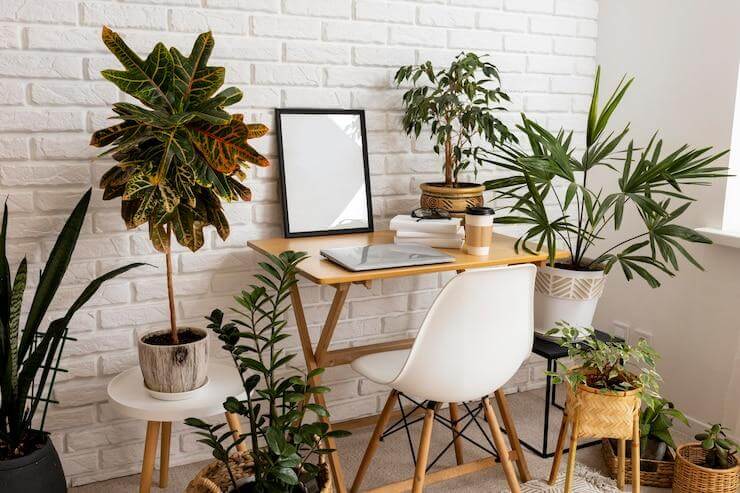Houseplants are plants that can be grown inside your home. It is frequently utilized to add decoration or aesthetics to many rooms in your house, including the office, bedroom, living room, and even the comfort room. Even though one of the few reasons why many people buy houseplants is for decorative purposes, this is only one of them.
A houseplant has several benefits, including those that are good for both the environment and your health. If you are planning to purchase one, you must also know its drawbacks. This article will guide you in evaluating whether the benefits of having houseplants suit you or if you can live with their drawbacks. We’ll also provide you with advice on which houseplants to purchase.
Benefits of Houseplants
People have been growing plants in pots and bringing them inside their homes for thousands of years. In addition to improving our physical health, it also benefits our mental and social well-being. Here are some of the benefits that a houseplant can bring to your home:
Enhances the Quality of the Air
The physical changes in the environment are one of the ways why plants connect with people. Indoor plants play a big part in phytoremediation. Which uses plants to absorb and eliminate harmful elements from the air, reduce their bioavailability in soil, or both. According to a NASA study, numerous interior pollutants, including formaldehyde and carbon monoxide, were lowered in levels by several typical foliage plants.
It brings a good balance of oxygen and carbon dioxide levels into your home. Additionally, houseplants also increase the percent level of relative humidity in your home, which makes it more cold and breezy in your room even in the summer season. Furthermore, it also reduces noise pollution, which forms an acoustic buffer zone that lessens the effect of unwanted noise coming from the outside or interior of your property.
Good for Your Well-Being
Houseplants indeed bring positive energy to any household, as claimed by feng shui, and taking care of them is therapeutic, especially for those people that are experiencing mental illness. It also reduces physical symptoms, including weariness, hoarseness, and cough. Numerous research studies have shown that people are more attentive and concentrated when working next to an indoor plant.
It also improves the productivity and creativity of a person. Additionally, it lowers stress and anxiety, which is another reason why many individuals have indoor plants in their bedrooms, offices, or study spaces.
Very Decorative
Aside from health and environmental benefits, houseplant is also useful when it comes to decoration purposes. It can add to the aesthetic of your home. Many small or big indoor plants are great for decorations. You can place them in the corner or near the window for direct sunlight. You can even use it as a prop for your DIY photoshoot at home.
Drawbacks of Houseplants
For every benefit, there are corresponding drawbacks, and knowing it is essential. Here are some of the drawbacks you can consider before purchasing an indoor plant:
It can be Expensive
There are other less expensive options for indoor plants, although most of them are a bit too expensive. Rare kinds of indoor plants cost hundreds of dollars, meaning you must invest a lot of money in them before you can take all the advantages they have to offer.
It can be Messy
If you have a pet that enjoys chewing a lot, it can be annoying when dried leaves of an indoor plant fall to the ground, especially if you are only starting to take care of it and you are still adjusting to their natural pattern.
Some Indoor Plants are Poisonous
Before making any purchases, it’s vital to conduct some research on the plants that are suitable for your needs and home, especially if you have pets and children. Instead of providing benefits, it might hurt them and even do more harm.
Lots of Maintainance
Although many plants do not need that much time to take care of, all plants have different types of needs. Some plants may need more sunlight and minimal watering, while others may require more sunlight and less watering.
In addition, the placement of the plant is crucial since it will determine whether or not it receives the necessary quantity of direct or indirect sunlight. For this reason, you may find yourself moving the plants often from one corner to another to meet the standard amount of sunlight they need.
Indoor Plants Suggestions You Can Have At Home
The following are the types of house plants that we suggest to give you an idea of what to look into and purchase:
- Cacti and Succulents
- Snake Plant
- Peace Lily
- Swiss cheese plant
- Calathea
- Zanzibar Gem
- Aloe Vera
- ZZ Plant
- Rubber Plant
- Spider Plant
- Lavender
- English Ivy
- Rose Mary
- Philodendron
- Azalea
To Sum Up,
We hope that this information will assist you in deciding on whether or not to buy an indoor plant, and if you are still undecided, make sure that you do your research first. So you can have an idea on what are the specific needs you want for a plant.

